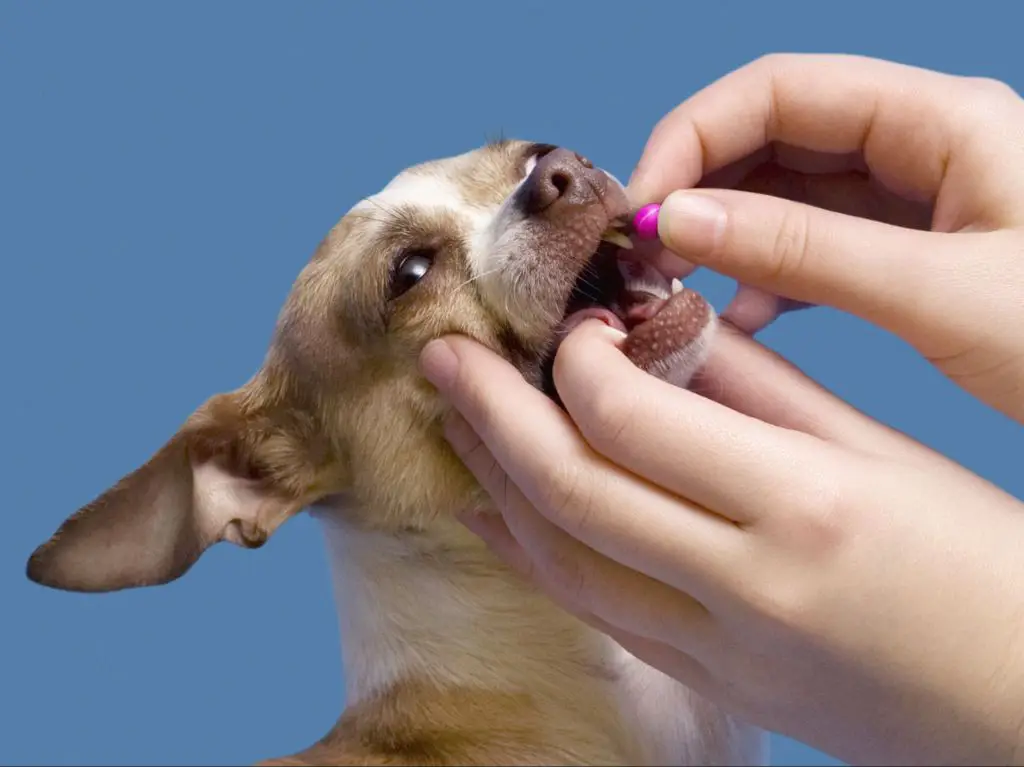Introduction
If you’re a dog owner, you may have wondered whether you need to deworm yourself too. Intestinal worms and parasites are common in dogs, raising concerns about transmission between pets and humans. While the risk is low for most people, there are important factors to consider.
In this article, we’ll cover the basics of deworming, explain which parasites pose a risk for humans, identify high-risk groups, and provide recommendations on preventative measures. You’ll learn when self-deworming may be appropriate and how to do it safely and effectively. We’ll also touch on holistic alternatives. By the end, you’ll have a better understanding of if and when you should deworm yourself alongside your furry friend.
What is Deworming?
Deworming is the process of eliminating intestinal parasites, commonly known as worms, from an animal’s body. These parasites can infect the gastrointestinal tract of dogs and cats, causing a variety of health issues. The purpose of routinely deworming dogs is to prevent or treat an infestation before permanent damage is done.
Some of the most common deworming medications used on dogs include:
- Fenbendazole – Kills roundworms, hookworms, and whipworms
- Milbemycin Oxime – Treats and controls hookworms, roundworms, and whipworms
- Praziquantel – Effective against tapeworms
- Pyrantel Pamoate – Treats roundworms and hookworms
These broad-spectrum dewormers help eliminate parasitic worms from a dog’s system. Deworming is an important preventative care measure for canine health and should be performed routinely under veterinary guidance. It helps prevent worms from infecting humans, especially children, who have close contact with dogs.
Common Intestinal Parasites in Dogs

There are several common intestinal parasites that can infect dogs and potentially be transmitted to humans. These include:
Roundworms
Roundworms are very common in puppies. They are long, thin worms that live in a dog’s intestines. They shed eggs that are passed in the stool. Humans can accidentally ingest infective eggs through contaminated soil or food. In people, roundworms can migrate through tissues and cause disease.
Hookworms
Hookworms attach themselves to a dog’s intestinal wall and feed on blood. They can cause blood loss, malnutrition, and diarrhea in infected dogs. Humans can contract hookworm through skin contact with contaminated soil. Hookworm larvae can penetrate human skin and cause cutaneous larva migrans.
Whipworms
Whipworms live in a dog’s cecum and colon. They cause chronic diarrhea, weight loss, and other issues. Humans can accidentally ingest whipworm eggs, but infection is rare.
Tapeworms
Tapeworms live in a dog’s intestines and shed segments containing eggs. They are transmitted when a dog ingests a flea or small mammal infected with tapeworm larvae. Humans can accidentally ingest tapeworm eggs and develop an intestinal infection.
Giardia
Giardia parasites attach to the intestinal wall and cause diarrhea. Dogs contract giardiasis by ingesting contaminated soil or water. Giardia can spread from dogs to humans through fecal contamination.
Coccidia
Coccidia parasites invade and damage the intestinal lining of puppies and dogs. Dogs shed coccidia in their feces, which can contaminate soil and water. Humans can accidentally ingest coccidia and develop intestinal issues.
Zoonotic Diseases
Zoonotic diseases are illnesses that can be passed from animals to humans. Many intestinal parasites and worms that infect dogs can also infect people through direct contact with the animal or its feces.
Some common zoonotic parasites that can be transferred from dogs to humans include:
- Roundworms – Can cause visceral larva migrans, which leads to fever, cough, and pneumonia-like symptoms in humans.
- Hookworms – Can cause cutaneous larva migrans, resulting in severe itching and a winding rash on the skin.
- Giardia – Causes diarrhea, gas, greasy stools, stomach cramps, and nausea.
- Cryptosporidium – Leads to watery diarrhea, stomach cramps, nausea, vomiting, and fever.
- Toxocara – Can cause vision loss, rashes, fever, and cough if the larvae migrate to organs like the liver, lungs, or eyes.
In most cases, the symptoms in humans are similar to a stomach bug, but certain worms can lead to more severe illness if left untreated. People with weakened immune systems are at higher risk of infection.
Risk Factors for Human Infection
There are several ways that humans can be exposed to intestinal parasites from dogs:
– Picking up dog feces: If you don’t promptly pick up and dispose of your dog’s feces, the parasites’ eggs can linger in the environment and be accidentally ingested by humans. Always wear gloves and wash your hands after handling dog waste.
– Letting dogs lick faces: Dogs can transmit parasites like roundworms and giardia through licking. Avoid letting dogs lick your face and mouth.
– Contact with contaminated soil: Public parks, beaches, and backyards can contain parasite eggs shed in dog feces. Wear shoes in public places and make sure children wash hands after playing outside.
– Eating unwashed vegetables: Fruits and vegetables grown in gardens where dogs go to the bathroom can pick up parasite eggs. Always wash produce thoroughly before eating.
Preventative Measures
There are several preventative measures you can take to reduce your risk of contracting intestinal parasites from your dog:
- Deworm your dog regularly as recommended by your veterinarian. Puppies should be dewormed every 2 weeks until 12 weeks old, then monthly until 6 months old. Adult dogs should be dewormed at least 2-4 times per year.
- Wash your hands thoroughly with soap and water after having contact with your dog, cleaning up after them, or handling their feces.
- Pick up and dispose of your dog’s feces promptly when taking them outside. Do not allow them to openly defecate in areas where children play.
- Wash fruits and vegetables thoroughly under running water before eating them raw. This removes any parasite eggs that may be present from contact with contaminated soil.

Practicing good hygiene and sanitation measures helps prevent the transmission of intestinal parasites from dogs to humans.
When to Deworm Yourself
While deworming yourself if you have a dog may seem appealing, it should only be done under the guidance of a doctor. You should consider deworming yourself if you have been diagnosed with a zoonotic parasite that can be transmitted from your dog. Some examples are roundworms, hookworms, whipworms or giardia.
Do not attempt to self-diagnose or self-treat, as this can be dangerous. Intestinal parasites require specific medications to effectively eliminate. Taking pet dewormers without a prescription is also not recommended, as the dosages are formulated for animals and may be toxic for humans.
If you are concerned about potential transmission of intestinal parasites from your dog, have a discussion with your physician. They can order diagnostic tests and prescribe you a human-approved deworming medication if necessary. Always follow your doctor’s recommendations and complete the full course of any prescribed dewormer.
While proactive deworming when owning a dog may seem logical, it should not be done without oversight. Work with your healthcare provider to determine if and when deworming is advisable based on your individual risk factors and test results.
Dangers of Self-Deworming
While the idea of self-deworming may seem appealing, there are significant dangers associated with using pet dewormers on yourself without medical supervision. Here are some of the key risks:
Pet dewormers can be toxic for humans – Dewormers formulated for animal use often contain higher concentrations of active ingredients that can be toxic if misused by humans. Consuming animal dewormers can lead to overdose and serious complications.
Self-deworming may cause adverse reactions – Pet dewormers have not been tested for safety in humans. Even if you match the dosage for your weight, you could still experience allergic reactions, side effects, or medication interactions that have not been established.
Ineffective against human parasites – The active ingredients in pet dewormers are tailored for specific intestinal parasites found in dogs and cats. They may not be effective against parasitic worms that infect humans. Self-deworming could fail to address your underlying infection.

Given the lack of evidence on safety and efficacy, self-deworming with veterinary products carries substantial risks and side effects. Consult a doctor first to explore treatment options designed specifically for human patients. Do not attempt to self-medicate with pet dewormers.
Holistic Deworming Methods
In addition to conventional medicine, there are some natural and holistic approaches that may help deworm both dogs and humans. However, it’s important to note that these should not replace medical treatment if an infection is suspected or confirmed. Consulting with a doctor first is always recommended when exploring alternative remedies.
Some natural options that may help kill parasites and promote gut health include:
- Pumpkin seeds – Contain a compound called cucurbitacin that may paralyze worms and prevent them from attaching to the intestinal walls.
- Papaya – Contains enzymes like papain that may have anti-parasitic effects. Papaya seeds also have anthelmintic properties.
- Garlic – Has allicin, ajoene, and other compounds that may be toxic to parasites. However, dosing needs to be monitored carefully.
- Probiotics – Can help promote a healthy gut microbiome and potentially crowd out parasites.
- Diet changes – Eliminating sugars and refined carbs, and increasing fiber may help create a less hospitable environment for parasites.
While promising, keep in mind these remedies have limited evidence for effectiveness in humans. It’s important to consult with a doctor and not solely rely on natural deworming methods if a parasite infection is suspected. But some may provide additional support when paired with medical treatment.
Conclusion

In summary, intestinal parasites like roundworms, hookworms, tapeworms and giardia can spread from dogs to humans through contact with infected feces. However, the risk is relatively low for most people. Practicing good hygiene like washing hands after touching pets can help prevent transmission. Routine veterinary care and deworming your dog helps minimize zoonotic disease spread. While true zoonotic infection is rare, symptoms like abdominal pain or diarrhea may warrant a doctor’s visit. Don’t try to self-medicate with veterinary dewormers which could be dangerous. Instead, consult your physician who can diagnose and properly treat any potential parasitic infections. With some simple precautions, you can continue to safely enjoy life with your furry companion.